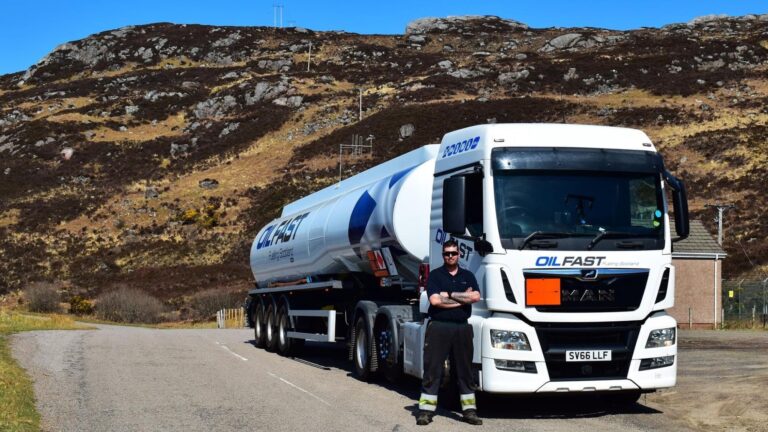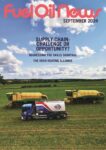
Claudia Weeks, Community Content Lead for Fuel Oil News, spoke to several of those that have already taken the step from the armed services into fuel distribution, to find out more about their career path, how they are finding the transition and whether they would recommend the industry.
Veterans into Logistics
Veterans into Logistics is a charity that trains and mentors veterans into new careers as HGV drivers. The charity raises its own funds to cover HGV licence and training costs. It personally supports veterans and service leavers with training tailored to their individual needs, then guarantees an interview, or employment, with one of their many partners.
Darren Wright, a former Royal Artillery Airborne Gunner, is the founder of the charity. Darren was working as a fuel tanker driver when he set up the charity, which has now helped hundreds of military veterans to obtain their HGV class 1 and class 2 licences and move into new logistics careers.
Darren explains why he set up the charity: “I believe many armed forces veterans and service leavers are ideally suited to new careers as HGV drivers, especially as some serving military get trained as fuel tanker drivers, as part of their job, and some get trained as fuel tanker drivers in case there is a petrol strike.”
A highly skilled and well-paid career Darren expands further on the reasons why armed forces veterans make excellent fuel industry employees: “I enjoyed the eight years I spent working as a fuel tanker driver, and consider it the pinnacle of being an HGV Driver. It’s a highly skilled, well-paid career and I liked the responsibility involved. I started my fuel tanker driving career with Certas Energy and later drove for DHL delivering fuel to the Morrisons supermarket forecourts.
“I would recommend working as a fuel tanker driver to armed forces service leavers and military veterans. They are disciplined from their military career and follow procedures to the book.
“I was working as a Morrisons HGV fuel tanker driver when I decided to set up Veterans into Logistics. The charity has developed excellent partnerships with logistics companies who return to us for their HGV drivers because our veterans are hard-working, dedicated and conscientious employees. They have a wealth of skills from their time in the military, which are transferrable to the civilian workplace.
“When working as a fuel tanker driver, I was earning a good wage, more than some in university graduate careers, despite not having a formal education. I realised this could be an ideal career for many ex-military who may not be academic, but still deserve to earn a good wage with respectable companies so they can provide for themselves and their families.
“I would urge any armed forces veteran or service leaver to contact us at Veterans into Logistics if they are considering a new career in the logistics industry.”
The army
Claudia spoke with two ex-military tanker drivers in the fuel industry to find out how they have found the transition: Chris Donaldson, tanker driver for Oilfast, and Jamie Rinaldi, tanker driver for New Era Energy, both served in the British Army.
Jamie began by explaining his background: “I joined the British Army in 2014, and served almost 5 years in the Royal Logistics Core as a driver, driving on- and off-road to set locations, to drop off resources and personnel.”
Chris shared his army experience: “I joined the Army Reserve on May 25, 2005, and was medically discharged on January 31, 2024, so I served just shy of 19 years in the forces.
“My role, when I started, was Formation Reconnaissance which was on CVRT (combat vehicle reconnaissance tracked) and in 2014, we rerolled due to army restructuring and I became a light cavalry role on RWMIK and Jackal vehicles.
“Reconnaissance is gathering battlefield intelligence and information on enemy forces so the battle picture can be understood, and operations can be planned and executed on the information and intelligence gathered. I did two operational tours of Afghanistan, and trained in Germany, Canada, Cyprus and all over the UK.”
Leaving the armed forces
Leaving the armed forces can be a big decision, as Jamie explained: “I was extremely proud to serve in the army and it was a tough decision to leave. I loved the job and had made friends for life. However, it was the right decision to leave as I felt like the pay wasn’t enough to get you on the property ladder!
“I left the army knowing I wanted to be in the fuel industry, and I was lucky enough to be offered this job at New Era Energy before my last day of service!”
Chris explained his reasons for leaving the army: “Well, for me it was slightly different as I was in the reserves, so the transition from military to civilian wasn’t too hard. I must say that I do miss the lads, the sense of camaraderie and just being a soldier – I loved it! It certainly was a huge part of my life, but now I can focus on my family and my current role. As a good friend said to me: “You can take the boy out the army but not the army out of the boy!”
Why the fuel industry?
For Jamie, the decision was logical: “I had obtained my ADR and HGV licences in the military and wanted to maximise a salary from the skills the army had given me.”
Chris explained how he joined the industry: “The fuel industry always appealed.
I had tried jobs in other industries like food delivery, general haulage, scrap metal haulage and flatbed work but they didn’t feel like a natural fit.
“I feel at home in the fuel industry, just like I did in the military. I love the challenge it can give you, the sense of responsibility, and being a part of a close team.”
A transfer of skills
Claudia was keen to know whether the skills and knowledge learnt in the armed forces were a good fit for the fuel industry. Chris agreed: “Absolutely! In the military you are trained and drilled until its second nature. You must work under high pressure, perform your duty and come up with workable solutions, even if the odds are stacked against you!
“This job is fast paced, it can change with short notice, there can be problems with deliveries, and you often have to problem solve independently. Having a military mindset is a perfect fit for this industry!”
Jamie added: “Skills and knowledge from serving in the army are easily transferred to the fuel industry. For example, anyone that has undertaken any sort of replenishment job in the army will know that it’s the same principles – drive to a location, top up the resources, and leave, in a safe and timely manner.
“I believe that most of the army skills learned can be directly translated to being an HGV driver. Being safe, a positive, can-do attitude, basic map and route planning, a good attention span and organisation are key to working in this industry.”
Driver shortages
There have been driver shortages in the HGV sector over the last few years. Chris explained his belief that armed forces veterans would be a good source of employees for the industry: “Most ex-military will have their licences when leaving the service, along with firsthand experience in operating their vehicle class. They really can hit the ground running!
“As a driver there is a lot of responsibility placed on us to complete a job on time, safelyand to the satisfaction of the customer. The company also wants to have complete trust in us knowing that the job will be done well. Ex- military personnel pride themselves on doing a job well – first time!
“We can think outside the box, we can work extremely well in a team setting, or as a solo operator, we like procedures or processes, we don’t give up when we see a challenge, or an obstacle, and we can work under pressure.
“I also feel that ex-military can also easily step into management and training roles as it’s something that comes with promotion in the forces. A veteran in your business really comes with a lot of benefits!”
A recommended transition
When asked whether they would recommend the fuel industry to veterans, both Jamie and Chris were in agreement.
Jamie said: “I would happily recommend the industry. In the army I was posted to 44 sqn at RMAS; it was incredibly busy and demanding, so now I work half the hours and earn twice the salary. Financially it’s a no brainer! If you enjoy driving and want a good career, then the fuel industry is the place for you!”
Chris concurred: “100%! The fuel industry feels so similar to the military – in the way you’re trained, the way you operate, and the way you conduct yourself.
“It’s a steady job, with good pay, and has long term employment opportunities, which is what a lot of veterans look for when leaving. The job isn’t for everyone, but I love it. I would recommend the industry to anyone who is leaving the forces. I feel at home, I feel comfortable, and I know I can use the skills I’ve learned in the army to help my colleagues and my team.”
New opportunities in the business realm As Chris mentioned, armed forces veterans aren’t just suitable for tanker driving; there are a variety of management and training roles within the industry that may also be an excellent fit.
Richard Campbell, Head of Growth for LCM and an armed forces veteran, explained more about his own transition into the fuel industry: “I spent twelve years in the army, retiring as a Major. My primary role was as an Operations Officer, where I was responsible for planning and executing operations globally.
“Leaving the military was a significant leap into the unknown,” Richard continued.
“While I was eager to leverage my army experience in the civilian world, I was also open to exploring new opportunities in the business realm.
“My final posting in the army with the Joint Helicopter Command exposed me to the criticality of fuel infrastructure. This experience, combined with my subsequent role in defence fuel infrastructure, solidified my interest in the fuel industry.”
Invaluable military skills
Claudia asked Richard if the skills and knowledge he learnt in the army have helped in his new role with LCM: “Absolutely. Certain military skills have proven invaluable in my civilian role. Operational planning, for instance, is a core competency. However, the business acumen required in the fuel industry is a different ball game altogether.”
When asked whether he felt veterans would be a good source of new drivers for the industry, Richard was totally convinced: “Without a doubt, veterans would be an excellent source of HGV drivers. Their discipline, reliability, and ability to operate under pressure are ideal for the role. It’s a solution we’re actively exploring at LCM.
“I would wholeheartedly recommend the fuel industry to veterans. It’s a dynamic sector offering global opportunities. The industry’s challenges are similar to those faced in the military, requiring strategic thinking and problem-solving.”
Thanks to Darren at Veterans into Logistics, Chris at Oilfast, Jamie at New Era Energy and Richard at LCM for sharing with us.
If you have armed forces veterans that would like to share their own experiences of transitioning to the fuel industry, please contact: claudia@andpublishing.co.uk
Image credit: Oilfast
